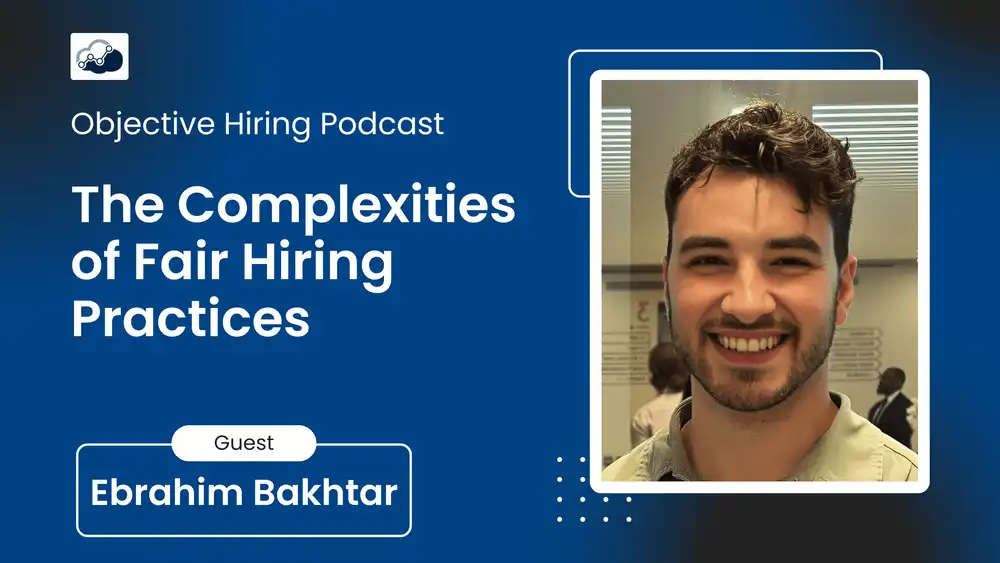Ebrahim Bakhtar on Why Technical Tests Alone Don’t Work: The Human Side of Hiring Data Talent

Hiring for data roles often means walking a fine line: you want candidates who can demonstrate technical chops, but you also need people who’ll thrive in your specific culture.
In this episode of the Objective Hiring podcast, Tim Freestone, founder of Alooba, speaks with Ebrahim Bakhtar, Marketing Analytics Expert at PMG, about exactly this challenge.
“It takes a special sort of person to really enjoy working in an agency... and finding that combination of technical and character traits is still relatively rare.”
Ebrahim outlines the stark differences between hiring for senior versus junior roles. Seniors get a structured case study task that pushes them to demonstrate everything from tracking setup to dashboarding. Juniors? The task would be “totally unfair.”
“I don’t expect them to know what Google Tag Manager is. Yet what matters is potential—and character.”
Instead, PMG runs what he describes as a “life story” interview. It’s designed to unearth what drives a candidate, how they think, and whether they’re likely to succeed in the fast-paced agency world.
Not Everything Is Measurable
Though the hiring process has structure, much of it comes down to gut feel. Ebrahim admits that early-stage conversations rely on informal judgment rather than hard metrics.
“There’s no really quantifiable metric we’re using... it is a bit of a subjective choice.”
That said, they do have a basic maths test (around GCSE level) to avoid setting candidates up for failure. It's not a brutal gatekeeper, but a filter to help ensure they’ll succeed technically.
Why Hobbies Matter
One of the more surprising insights from the episode was Ebrahim’s view on hobbies. In a sea of similar CVs, hobbies offer a glimpse into motivation, curiosity, and self-discipline.
“Are they someone who does a very aspirational hobby? Something creative? Either way, it shows they’re figuring out who they want to be.”
This also serves to compensate for the reality that many entry-level candidates haven’t yet developed a track record. Without that, potential is often easier to see in how they spend their free time.
Culture Fit is a Two-Way Interview
Candidates don’t just have to be assessed—they need to assess the company too. That’s why PMG includes a final informal chat with a junior team member, with no manager present.
“We want them to qualify us as much as we qualify them.”
It’s a clever way to break the traditional power imbalance of interviews and lets both sides see if the fit feels right.
Extending the Interview Into Onboarding
Another standout takeaway is how Ebrahim treats the first few months on the job as a continuation of the hiring process.
“It takes a long time to really get to know who someone is... don’t relax just because they’ve signed the contract.”
He looks for early behavioural cues: are they showing initiative? Are they forming connections? Silence, oddly enough, can be a red flag.
“If you’re not hearing any feedback about them across the business... that’s a sign to start asking questions.”
Data + Character = Better Hiring
If you're only testing technical skills, you're missing half the picture. Platforms like Alooba help companies bring objectivity into their hiring—but that still needs to be paired with human judgment.
For PMG, it’s clear that success hinges on more than just aptitude.
“You don’t know what good looks like until you see it.”
This episode is packed with insights on building a thoughtful, empathetic, yet rigorous hiring process—especially for those trying to scale data teams.
Ebrahim also touches on something many hiring managers face but rarely vocalise: how hard it is to communicate culture effectively during hiring. Job descriptions often fail to reflect the nuances of a team’s working style or what success in the role actually looks like.
“Everyone can say they’re a great agency to work for. But saying it isn’t enough—you have to prove it.”
PMG attempts to show this by connecting candidates with team members early, allowing potential hires to hear directly from peers about day-to-day realities. This method doesn’t scale easily, but for high-stakes hires, it’s one of the most authentic ways to build trust.
Another subtle but powerful part of PMG’s hiring process is how juniors are evaluated. The process is built with empathy at the core, designed to put nervous grads at ease and coax out their potential. Ebrahim recalls how bewildering it is to graduate and not really know what you want—and designs interviews that allow for that uncertainty.
“I remember graduating and not having a foggy idea what I was trying to do.”
Rather than punishing ambiguity, the process focuses on whether someone is likely to grow in the environment offered. This means hiring managers have to look beyond typical indicators—like grades or degrees—and tune into less obvious traits: motivation, humility, curiosity.
At a time when some companies lean into automation or keyword filters, Ebrahim’s approach is refreshingly human.
For any company aiming to build stronger, more dynamic data teams, this interview is a goldmine of practical approaches.